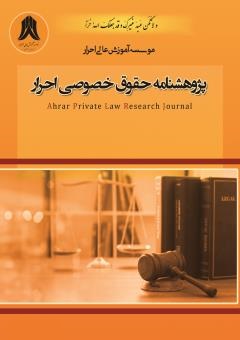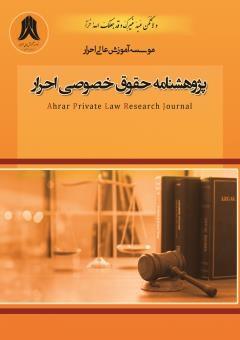-
-
List of Articles
-
Open Access Article
1 - Civil responsibility of hospital construction, the centrality of legal entities in Iranian law
Mohammad Khobi mikhosh -
Open Access Article
2 - Investigating the formation of fake news and examining modern forms of fake news
Hadi Abangah Azgomi -
Open Access Article
3 - Consumer Rights Of Food Products
Mahvash Abolghasem Kashani -
Open Access Article
4 - The Role Of Good Faith Principle In Iranian Law And International Commercial Contracts (During Negotiation, Conclusion, Performance And Interpretation Of Contracts)
Nazila Taghavi -
Open Access Article
5 - Examining The Satisfaction Of Patients Visiting The Emergency Department Of PourSina Educational-Medical Center In 2023
Kourosh Delpasand Amir Fakhraei Zohreh Kazempour kalshatri Enayatollah Homayi rad Doreen Aghajalani Shirin Maafi kalorzi Mohammad Nooryan مرضیه آزادگان -
Open Access Article
6 - Analytical Study Of The Differences Between The 1956 And 1976 Rent Laws And Their Advantages And Disadvantages
Fateme Farad_e_falsafi -
Open Access Article
7 - Medical Liability Between Islamic Republic Of Iran And Italy
Samad Golbandi Haqiqat -
Open Access Article
8 - Comparative Study Of Suspension Of Validity Conditions From The Perspective Of Imam Khomeini And Ayatollah Khoei
Farshid Khosravi -
Open Access Article
9 - An Examination Of The Condition Of Suspended Contracts From The Perspective Of Sheikh Ansari And Sahib Jawahir Al-Kalam
Morteza Mohammad zade -
Open Access Article
10 - Pregnancy: Right Or Duty
Neda Akbar zade -
Open Access Article
11 - Civil liability of arbitrators in online arbitration
Reza Shahidi sadeghi -
Open Access Article
12 - Children's Health And rights In Cyberspace.
Mohammad Taati sereshke Seyedeh Maryam Asadi nejad
-
The rights to this website are owned by the Raimag Press Management System.
Copyright © 2017-2026







